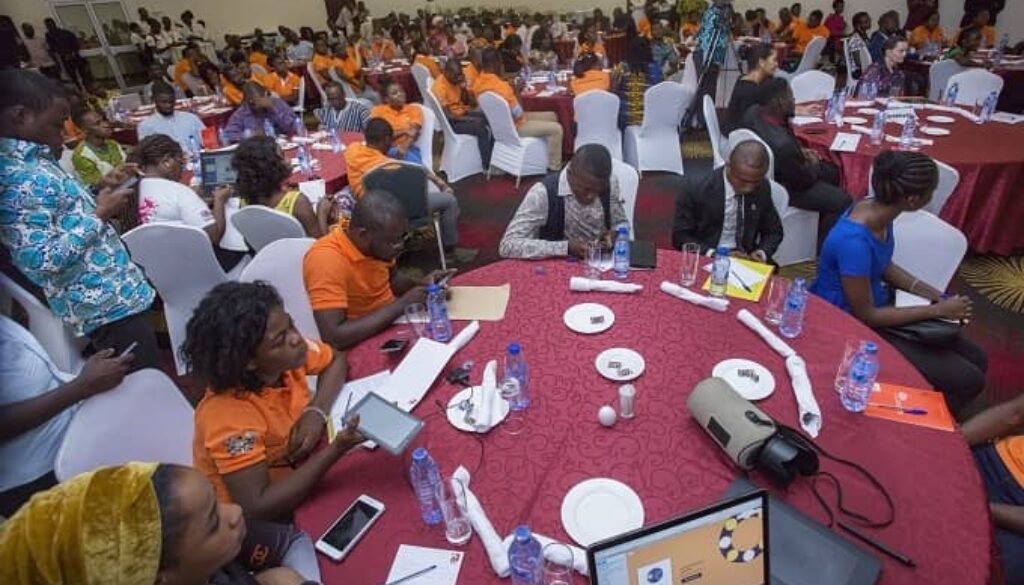YOUTH IN ENTREPRENEURSHIP: THE SUCCESS STORY OF PORTIA AND PATRICIA
BY: NANA ANDOH AMEKAH

Youth in entrepreneurship has received a facelift in the country in recent times as many young Ghanaians show massive interest in creating their own livelihoods.
The massive unemployment in the country to some extent has tickled many young individuals to gather up their creative and innovative skills to create jobs for themselves, contributing to reduction of unemployment and general economic growth.

Two amazing women, Portia Yayra Ahadzi and Patricia Sasu Danquah, have emerged as prominent players in the colorful landscape of Ghanaian entrepreneurship, leading to innovation and leaving a lasting impact across multiple sectors.
Their inspiring experiences in snack making, fashion, and Ghanaian entrepreneurship as they overcome obstacles and contribute to economic growth and employment creation.
Portia, an enterprising entrepreneur, has built a booming snack business on her delectable samosas and spring rolls. Portia has become a beloved seller of these exquisite sweets after recognizing the desire for simple and flavorful snacks.

Her commitment to high-quality ingredients and thorough preparation procedures ensures that every mouthful of her samosas and spring rolls entices clients with delectable flavors. Portia’s cooking abilities provide delight to countless people by giving them tasty and pleasant snacks that brighten their day.
Patricia, a fashion industry visionary, set out with a goal to develop environmentally friendly clothing while also empowering neglected areas.
Her fashion line encourages ethical production practices, such as using locally sourced materials and hiring skilled artisans from undeserved communities. Patricia’s brand has earned an international reputation by merging traditional craftsmanship with contemporary designs, providing openings for Ghanaian entrepreneurs in the global market.
Despite challenges such as restricted market exposure and the availability of capital, Patricia’s tenacity and commitment to sustainability have inspired significant change in the fashion sector. Her achievement not only encourages ethical fashion and social empowerment but also contributes to economic growth.
Entrepreneurs confront a variety of challenges on a daily basis, and Portia and Patricia illustrate the perseverance required to overcome these obstacles. They have faced a variety of challenges in their entrepreneurial careers, ranging from financial constraints to governmental roadblocks and infrastructural limitations.
Limited access to finance and investment might make it difficult for them to establish or expand their initiatives, prompting them to seek alternative financing or get aid. Furthermore, infrastructural barriers such as insufficient transit networks or unreliable utilities can disrupt operations and raise costs. Despite these obstacles, Portia and Patricia’s determination, combined with helpful networks and resources, has moved them forward. Their success stories demonstrate Ghanaian entrepreneurs’ ability to overcome adversity, contribute to economic progress, generate job opportunities, and support long-term development.
Patricia and Portia both demonstrate the ideas of social entrepreneurship through their different businesses.
They demonstrate that firms can contribute to social and economic growth in ways other than profit. Their efforts motivate others to adopt new business models in order to create a more inclusive and prosperous Ghana.
Their efforts of creating not just livelihoods but also job creation and economic growth inspire many other young Ghanaians wandering around for employment to start something on their own be it smaller in their areas of endeavor and grow it to maturity and subsequently become greater exploits.
Ghana’s business environment is business friendly which has saw many small and medium businesses grow into something big employing numerous of workers.
What most often become a major challenge for most of the youths who have the zeal to go into business or start something good on their own is the issue of start-up capital.
Little support opportunities available for Ghanaian entrepreneurs are often available for existing businesses. One cannot vividly over look the stress that accompanies the limited grants for individuals who want to start their businesses.
Foeriegn grant donors, institutions and international organizations grant packages which most often executed by the government and some Non-Governmental organizations often come with a whole lot of controversies surrounding the funds, and that would take months and years for one to get access to funds, and even mostly becoming empty promises is killing individuals’ dreams to establish their businesses.
The government of Ghana had initiated a lot of programs that seek to give a definite shape to the concept of youth in entrepreneurship but the results had always not been a desirable one. However, we (the youth) expressed hope in the YouStart programe when the Finance Minister for the Akufo-Addo-led NPP administration, Hon. Ken Ofori Atta firt announced it in Parliament during the 2022 budget and economic policy presentation November 2021. the program was subsequently launched and kick-started but its progress has become apparently unknown and in-measurable.
It would have been a great deal of good exploit if the government had given a lot more attention in building the the skill of innovation and creativity in the youth, and instilled and elevated their entrepreneurial mindset through capacity building, skill-oriented education, and well-functioning funding packages.
In a country where the youth are made up of 11,782,614 (38.2%) according to the 2020 Population Census carried by the Ghana Statistical Service. This connotes that youth unemployment will drastically reduce or possibly be annihilate it entirely if half of the above figure are prepared to create their businesses.
Youth in entrepreneurship, skill-oriented learning approach, technical, vocational, technological and engineering empowerment is the ideal areas to be focused because the hold the hold the key to unlock the future.






